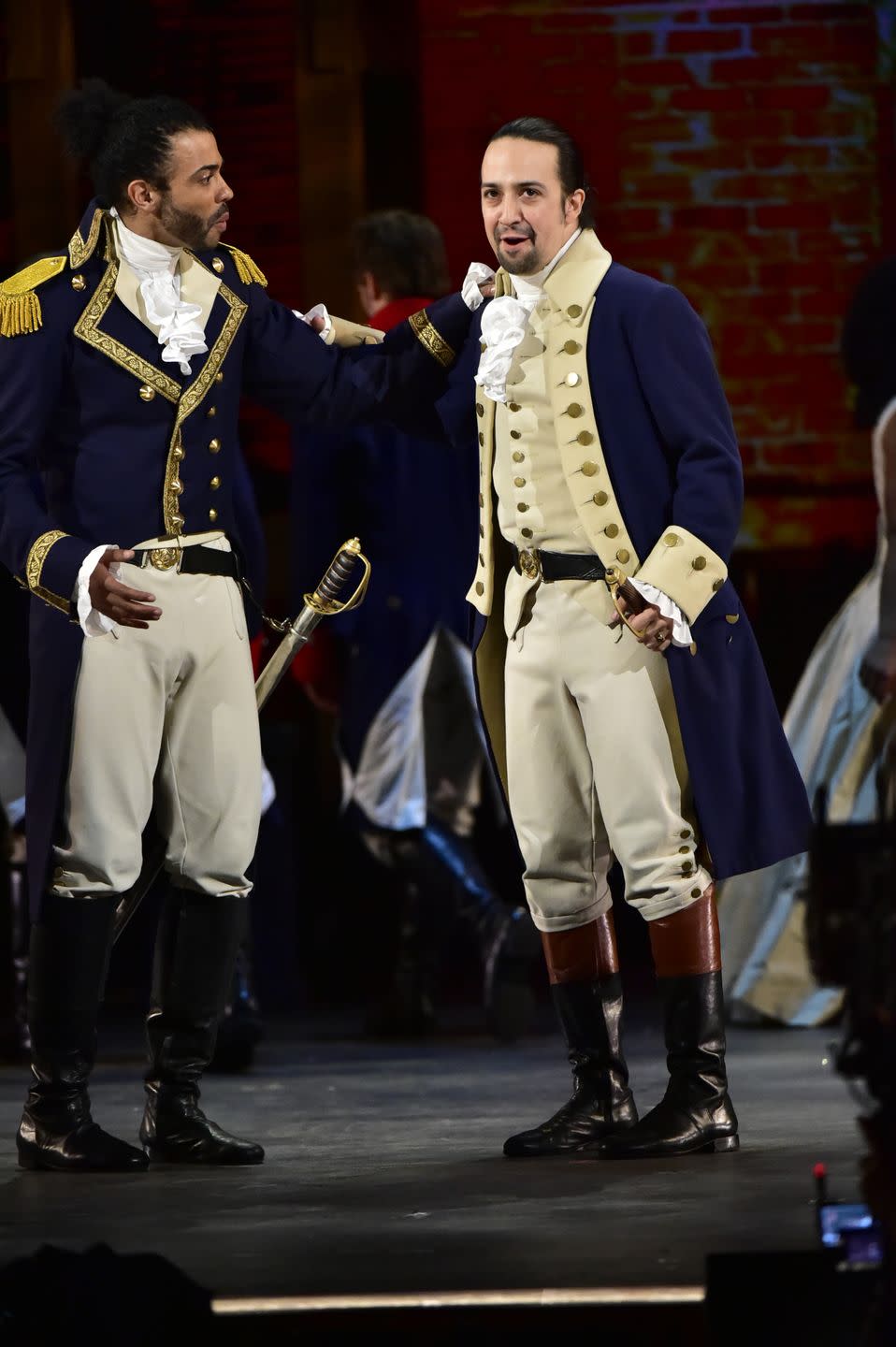Lin-Manuel Miranda Addresses Claims that 'Hamilton' Glorifies Slave Owners

The smash musical Hamilton, created by and starring Lin-Manuel Miranda, was made available to stream on Disney+ last Friday, ahead of the July Fourth weekend.
While many celebrated the launch of the musical, which focuses on the life and legacy of Alexander Hamilton, some criticized the production for ignoring the horrors of slavery and glorifying slave-owning historical figures.
Miranda acknowledged the backlash on Twitter, writing, "All the criticisms are valid."
The arrival of Hamilton to Disney+ has reignited a conversation about the hit musical's historical accuracy, especially regarding the real-life slave owners and slavery supporters portrayed in the story. The hip-hop stage production from Lin-Manuel Miranda, which debuted on Broadway in 2015, tells the story of Alexander Hamilton and his work with fellow Founding Fathers of the United States, featuring a predominantly Black and Latinx cast. Though the production has earned widespread praise for putting people of color and women at the forefront of a history that was written by and favors white men, some have argued that Hamilton glorifies the Founding Fathers while ignoring that many of them owned slaves.
On Monday, days after Hamilton's streaming debut, Miranda himself addressed the criticism on Twitter while responding to Tracy Clayton, host of Netflix's Strong Black Legends podcast. Clayton acknowledged the complicated nature of the debate, which highlights a story told by people of color but focuses on real historical figures who enslaved Black people or benefited from the system in some way.
"I really like that this conversation is happening," part of her post read. "Hamilton the play and the movie were given to us in two different worlds & our willingness to interrogate things in this way feels like a clear sign of change."
Miranda replied, understanding the critique and admitting that he "couldn't get" the "failings of these people" and ended up eliminating those parts of his characters' lives. "All the criticisms are valid," he wrote. "The sheer tonnage of complexities & failings of these people I couldn't get. Or wrestled with but cut. I took 6 years and fit as much as I could in a 2.5 hour musical. Did my best. It's all fair game."
Appreciate you so much, @brokeymcpoverty. All the criticisms are valid. The sheer tonnage of complexities & failings of these people I couldn’t get. Or wrestled with but cut. I took 6 years and fit as much as I could in a 2.5 hour musical. Did my best. It’s all fair game. https://t.co/mjhU8sXS1U
— Lin-Manuel Miranda (@Lin_Manuel) July 6, 2020
The criticism of Hamilton isn't new. Back in 2016, Pulitzer Prize–winning historian Annette Gordon-Reed fact-checked the musical in an interview with the Harvard Gazette, which academic Rachel Cargle promoted as necessary reading during the July Fourth weekend.
"He was not an abolitionist," Gordon-Reed said of the titular statesman. "He bought and sold slaves for his in-laws, and opposing slavery was never at the forefront of his agenda."
She also countered the implication that the politician was a "champion of the little guy," writing that Hamilton was an "elitist" in real life. "He was in favor of having a president for life," she added.
The New York Times reported that Hamilton was "genuinely antislavery," but his resistance to the institution may not have been as fervent as the musical might have viewers believe. Although both the stage production and some scholars have described Hamilton as an abolitionist, that statement is up for debate. As the Times pointed out, Hamilton cofounded the New York Manumission Society, which advocated to gradually end slavery in New York State (let's not forget, slavery wasn't exclusive to the American South). However, manumission isn't the same as abolition; the former depended on slave owners to voluntarily choose to set enslaved people free, whereas the latter required government jurisdiction to end the practice, according to the Times.

The musical only barely targets Thomas Jefferson as a "slaver," but most of the real life-characters in the story, including George Washington, Marquis de Lafayette, and the Schuyler family, also were. It's unclear if Hamilton was too; the evidence is scant. But according to historian Michelle DuRoss, the politician's grandson alleged that Hamilton owned one or more enslaved people, referencing a purchase in the politician's expense book. And as Gordon-Reed said before, he helped his in-laws, namely Angelica Schuyler and her husband, purchase enslaved people.
Whether Hamilton was a slave owner or not, Miranda understands that the statesman was "complicit in the system" of slavery, despite his vocal stances against it. "[Slavery] is in the third line of our show. It's a system in which every character in our show is complicit in some way or another," the composer and actor told NPR's Fresh Air podcast last week.
"Hamilton—although he voiced anti-slavery beliefs—remained complicit in the system," Miranda added. "And other than calling out Jefferson on his hypocrisy with regards to slavery in Act 2, doesn't really say much else over the course of Act 2. And I think that's actually pretty honest. ... He didn't really do much about it after that. None of them did. None of them did enough."
You Might Also Like

